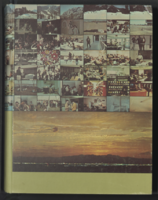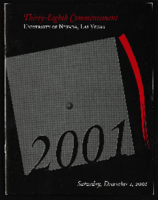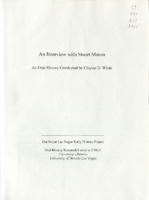Search the Special Collections and Archives Portal
Search Results

Meeting minutes for Consolidated Student Senate, University of Nevada, Las Vegas, March 20, 1975
Date
Archival Collection
Description
Text

Irving Junior Foreman interview, March 16, 1978: transcript
Date
Archival Collection
Description
From the Ralph Roske Oral History Project on Early Las Vegas collection OH-00600. On March 16, 1978, collector John Russell Foreman interviewed Irving Junior Foreman (born June 25th, 1930 in Beaver, Utah) in North Las Vegas, Nevada. In this interview, Foreman speaks about his career in the construction industry in Las Vegas, Nevada. He also discusses the changes in the construction industry from the 1950s to the 1970s, including the machinery used.
Text

Epilogue: UNLV Yearbook, 1970
Date
Description
Yearbook main highlights: schools and departments; detailed lists with names and headshots of faculty, administration and students; variety of photos from activities, festivals, campus life, and buildings; campus organizations such as sororities, fraternities and councils; beauty contest winners; college sports and featured athletes; and printed advertisements of local businesses; Institution name: University of Nevada, Las Vegas
Mixed Content

University of Nevada, Las Vegas (UNLV) 38th commencement program
Date
Archival Collection
Description
Commencement program from University of Nevada, Las Vegas Commencement Programs and Graduation Lists (UA-00115).
Text
Forever in Our Hearts Documentary
Identifier
Abstract
The collection is comprised of a short documentary film,
Archival Collection
Las Vegas Land & Water Company Records from the Las Vegas Valley Water District
Identifier
Abstract
The Las Vegas Land & Water Company Records from the Las Vegas Valley Water District (1918-1989) are primarily comprised of contracts, correspondence, and maps that document the establishment of a water distribution system in Las Vegas, Nevada that would provide water using the state's Colorado River allocation. The records include water main extension agreements, correspondence, and bills of sale for water main construction, as well as articles and correspondence documenting the groundwater shortage in Las Vegas. The collection also includes maps for water distribution systems and pipelines throughout the Las Vegas Valley.
Archival Collection
UNLV Libraries Collection of Circus Circus Hotel and Casino Promotional Materials and Reports
Identifier
Abstract
The UNLV Libraries Collection of Circus Circus Hotel and Casino Promotional Materials and Reports includes annual reports, financial reports, newspaper and magazine clippings, press kits, press releases, and promotional materials for the Circus Circus hotel and casinos in Las Vegas, Nevada, and Reno, Nevada, dating from 1972 to 2006.
Archival Collection

Transcript of interview with Stuart Mason by Claytee White, November 9, 2006
Date
Archival Collection
Description
In this interview, Stuart Mason discusses his family's construction business, Taylor Construction Co., and his involvement with building various Las Vegas Strip hotels including Caesars Palace and the Riviera, and remodeling the Flamingo. He talks about working within a "social contract" with the various unions, and other aspects of construction.
Stuart Mason was born in Columbus, Ohio, and moved with his family to Miami, Florida, when he was two years old. He received his bachelor's degree in business administration from the University of Miami in 1958. Shortly after graduation, he married his wife, Flora, and started working for Taylor International, the family business. He came to Las Vegas in 1964 to start work on Caesars Palace as the assistant project manager and eventually took over the management of the business. Mason has contributed greatly to the city of Las Vegas over the years through his contributions in the development and construction of the Las Vegas Strip and his commitment to the community. He and Flora started the Nevada Chapter of the Juvenile Diabetes Research Foundation in 1970. In addition, they made donations to the UNLV University Libraries to benefit the Undergraduate Peer Research Coaches program, which helps undergraduate students obtain their college degrees. In addition to his work on Caesars Palace, Mason worked on the original and new MGMs, The Rivera, The International, the Stratosphere, and the Desert Inn, along with remodeling work at the Flamingo. Other company projects can be found in Miami, Jamaica, Aruba, the Grand Bahamas, Melbourne and Puerto Rico. His two sons took over the family business in 1997, the same year that Mason started as the Vice President of Development for the Venetian Hotel Casino.
Text
Stardust Resort and Casino Records
Identifier
Abstract
The Stardust Resort and Casino Records (1950-2006) contain materials of the Stardust Resort and Casino, which operated in Las Vegas, Nevada from 1958 to 2006. The collection contains materials on events hosted by the Stardust, the resort and casino's corporate history, interior and exterior building design, and performers. The collection also includes photographs, negatives, and slides that document the history of the resort and casino. Newspaper and magazine clippings, advertisement and marketing materials related to the Stardust's venues, shows, entertainers, and events are also present in the collection. The collection also contains a significant amount of audiovisual material, including VHS tapes, audio cassettes, optical discs, film reels, and cassette tapes containing footage and audio recordings of Stardust show promotions, news broadcasting clips, interviews, and commercials featuring the Stardust.
Archival Collection

Transcript of interview with Arte Nathan by Claytee White, December 11, 2014
Date
Archival Collection
Description
Text
